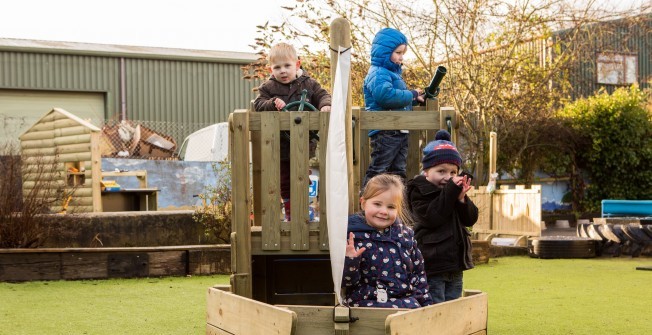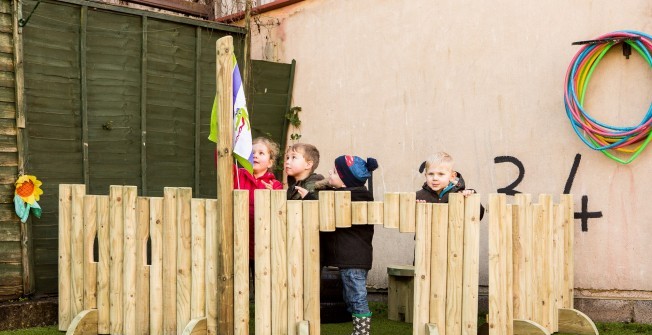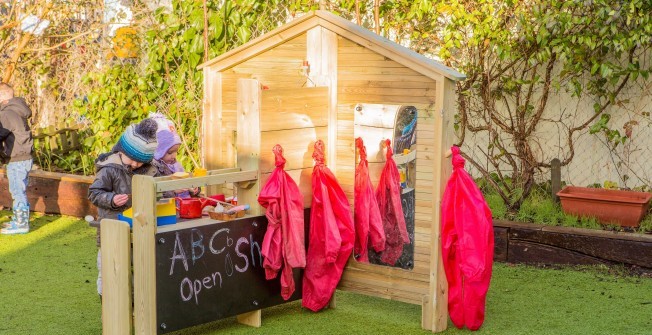We offer a Free quote and UK design service, get in touch today.
We offer a Free quote and UK design service, get in touch today.



Imaginative playground designs in Ampfield SO51 9 offer a creative and interactive space for children to engage in imaginative play, fostering their development through themed play structures, climbing elements, play panels, and interactive features.
Diving deeper into these playground concepts, the incorporation of creative themes and interactive elements sparks the young minds' curiosity and encourages storytelling and role-playing activities.
The presence of diverse climbing elements, such as rock walls and ropes courses, not only promotes physical fitness but also enhances problem-solving skills and spatial awareness among youngsters.
Play panels and interactive features, like musical instruments and sensory stations, provide opportunities for sensory exploration and social interaction, further enriching the play experience.
We have a huge range of ideas for imaginative play in Ampfield SO51 9 which is perfect for primary school students.
Our team can provide a range of products to assist with imaginative games, which will help to stimulate children's imaginations and encourage them to apply their own thoughts into the games that they play with each other.
The great thing about playing using your imagination is that there are no rules, so children can do anything and be anything they want providing it is safe to do so.
Youngsters might choose to act as different characters or simply using pieces of equipment in a new game they have made up.
Playing make believe and using imagination is vital in early learning, as this is when kids are growing and developing the most. OFSTED inspectors would love to see products which promote playing using imagination, because they will see the potential to develop children's skills.
If you are interested in creating an area for imaginative play in Ampfield, please complete the contact form we have provided.
Our professional team will be able to offer details on the various resources which we can provide as well as professional advice regarding the best products for your individual facility.
Imaginative play, also known as make-believe play, is a crucial aspect of child development where children engage in creative scenarios, role-playing, and exploration of imaginary worlds, fostering social, emotional, and cognitive skills.
Through imaginative play, children learn to communicate effectively, express emotions, and develop problem-solving abilities.
Parents play a vital role in nurturing their child's make-believe play experiences by providing a safe and supportive environment that encourages creativity and imagination.
By participating in make-believe activities with their children, parents can strengthen the parent-child bond and help build confidence in their little ones.
Furthermore, imaginative play allows children to make sense of the world around them, develop empathy, and enhance their social interactions with peers.
Imaginative playground designs vary widely, each aiming to stimulate children's creativity, social skills, and physical development through play. Here are several types of imaginative playground designs:
The average cost of an imaginative playground is £8,600 - £15,000.
However, the cost of an imaginative playground can vary depending on the size, materials used, and complexity of design, but the benefits it offers in terms of child development, social skills, and imaginative play make it a worthwhile investment for parents and communities.
When considering the cost of an imaginative playground, factors such as the quality of materials, installation fees, and ongoing maintenance should be taken into account.
Playgrounds made of durable materials like stainless steel, hardwood, and composite materials may initially cost more but are likely to last longer, reducing long-term expenses.
The design complexity and customisation options can significantly impact the final cost. Playground features such as climbing structures, slides, swings, and interactive elements may raise the price, yet these elements contribute to enhancing children's physical and cognitive development.
Engaging in imaginative play offers numerous benefits for children, including the development of social skills, emotional intelligence, creativity, and problem-solving abilities, providing a holistic approach to learning through interactive and exploratory experiences.
Imaginative play in Ampfield allows children to explore various roles and scenarios, fostering empathy and understanding towards others.
It ignites their curiosity, enhances communication skills, and encourages collaboration with peers during playtime, promoting a sense of teamwork and camaraderie.
Through imaginative play, children learn to adapt to different situations, think critically, and express their thoughts and emotions in a safe and imaginative environment.
This type of play also aids in developing resilience, decision-making skills, and the ability to think creatively outside the box.
Imaginative play plays a vital role in child development by enhancing social skills, fostering emotional intelligence, promoting communication abilities, and providing children with a creative outlet to express themselves and form meaningful relationships.
Through imaginative play, children can explore various social scenarios, learn empathy, and develop problem-solving skills by navigating different roles and situations.
It also aids in their emotional growth by allowing them to express and cope with their feelings in a safe environment.
Engaging in imaginative play enables children to improve their communication skills as they interact with others, negotiate roles, and share ideas.
This process not only enhances their linguistic abilities but also teaches them how to collaborate and work as a team.
The creativity involved in imaginative play sparks innovative thinking and encourages children to think outside the box, nurturing their imaginative capabilities and fostering a sense of curiosity about the world around them.
Encouraging imaginative play in children involves providing them with open-ended toys, engaging in role-playing scenarios, creating a supportive environment that nurtures creativity, and actively participating in their play experiences to boost their confidence and spark their imagination.
One effective way to foster imaginative play is to incorporate storytelling into their playtime.
This can involve creating make-believe worlds, scenarios, and characters that allow children to explore various roles and situations.
Offering a variety of materials such as art supplies, building blocks, and costumes can further enhance their creativity.
Encouraging children to engage in pretend play with peers can also promote imaginative thinking and social skills.
Organising playdates or joining playgroups can provide opportunities for collaborative play, problem-solving, and shared creativity.
Praising and acknowledging their creative efforts, no matter how small, can boost their confidence and motivation to continue exploring their imagination.
It's essential to value their unique ideas and perspectives, fostering a positive attitude towards creative expression.
Imaginative play activities in Ampfield encompass a wide range of creative scenarios, including make-believe play with dolls, constructing fantastical structures with bricks, exploring nature in outdoor settings, and participating in pretend games that enhance children's social interactions and relationship-building skills.
Parents and educators can introduce children to the joys of doll play, where they can assume the roles of caregivers, fashion designers, or even invent elaborate imaginary worlds for their dolls.
Brick building not only sharpens fine motor skills but also promotes problem-solving and cooperation as children collaborate to build complex structures.
Outdoor exploration provides a sensory-rich experience, enabling children to engage with nature, investigate their environment, and cultivate a sense of awe and curiosity.
Pretend play, a fundamental aspect of imaginative play, allows children to explore various roles, situations, and narratives through make-believe scenarios, fostering creativity, language development, and problem-solving skills.
This type of play is not just about fun; it plays a crucial role in stimulating creativity. By engaging in pretend play, children are not bound by reality, giving them the freedom to think outside the box, invent new storylines, and develop unique characters.
Through these imaginative scenarios, they can experiment with different perspectives and ideas, which ultimately boosts their cognitive abilities.
As children collaborate in creating these make-believe worlds, they enhance their social interactions and communication skills as they negotiate roles, share ideas, and cooperate with their peers.
Pretend play is a powerful tool that nurtures a child's holistic development by encouraging them to explore, create, and connect with others.
Dress-up and role-playing activities provide children with the opportunity to embody different characters, professions, and scenarios, encouraging creative expression, empathy, and cooperative play experiences.
Children engaging in these activities often step into the shoes of their favourite superheroes, doctors, chefs, or even magical creatures, allowing them to explore various personalities and characteristics.
Through pretend play, they not only broaden their imaginations but also develop an understanding of different perspectives and emotions.
Role-playing helps children practise crucial social skills such as communication, problem-solving, and collaboration as they interact with peers in shared make-believe worlds.
By working together to create narratives and scenarios, they learn the value of teamwork and build stronger bonds with their playmates.
This type of imaginative play nurtures empathy as children naturally put themselves in the shoes of the characters they embody, learning to consider others' feelings and viewpoints.
It fosters a sense of understanding and tolerance, laying the foundation for healthy relationships and effective communication in the future.
Building and construction play activities involve the use of blocks, Lego sets, and other building materials to create structures, designs, and imaginative worlds, promoting spatial awareness, problem-solving skills, and collaborative teamwork.
Engaging in these hands-on activities can significantly enhance a child's cognitive development, fostering creativity, critical thinking, and spatial skills.
The process of envisioning and building different structures not only stimulates a child's imagination but also encourages them to experiment, problem-solve, and think in three dimensions.
Outdoor play and nature exploration provide children with opportunities to engage with the natural world, discover new environments, and immerse themselves in sensory-rich experiences that stimulate curiosity, physical development, and environmental awareness.
Through interactions with trees, soil, water, and wildlife, kids develop a deep connection to their surroundings. These experiences foster a love for nature and instil a sense of responsibility towards the environment.
Outdoor play encourages children to use their imaginations, problemsolving skills, and physical abilities in unstructured settings, leading to improved creativity and motor skills. Engaging with the outdoors also helps in reducing stress, enhancing mood, and promoting overall well-being.
Activities such as playing dress-up, building forts, creating and acting out stories, and using toys to create imaginary scenarios are all examples of imaginative play.
Children as young as two years old can engage in imaginative play, but it usually peaks between the ages of 3-6 years old. However, children of all ages can benefit from engaging in imaginative play.
Parents can encourage imaginative play by providing open-ended toys and materials, creating a playful and safe environment, and participating in play with their children.
They can also allow unstructured playtime and limit screen time.
If you are looking for imaginary play equipment installers local to you who can provide a variety of school resources in your area and in nearby surrounding areas, our team can help you.
For more information regarding imaginative play in Ampfield SO51 9 make sure to contact our team members.
We'll offer more details with regards to different designs available as well as info on costs and prices involved.